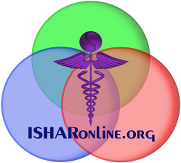Faith-Based
ISHAR Articles & References: Faith-Based
Functional Summary
Modality |
|
Direct or (more commonly) mediated supplications to a divine power, including a range of devotional acts or declarations. Mediators may transfer healing power with or without contact. |
Intention |
|
By expressing devotion and/or repentence for sins, a divine power, usually of a religious origin, will heal the devotee of ailments. |
Geo-Cultural |
|
Though faith-based healing is present in many cultures, it is most significantly represented in the Christian religion.
|
Definition
Faith healing is healing declared to be through spiritual means. Believers state that the healing of a person can be brought about by religious faith through prayer and/or rituals that, according to adherents, stimulate a divine presence and power toward healing disease and disability. Belief in divine intervention in illness or healing is related to religious belief and is most common in the Abrahamic faiths, especially Christianity. In common usage, faith-based healing refers to notably overt and ritualistic practices of communal prayer and gestures (such as laying on of hands) that are intended to solicit divine intervention in initiating spiritual and physical healing.
The concept that prayer, divine intervention, or the ministrations of an individual religious healer can cure illness have been popular throughout history. Miraculous recoveries have been attributed to many techniques commonly lumped together as "faith healing". It can involve prayer, a visit to a religious shrine, or simply a strong belief in a supreme being. Some people interpret the Bible, especially the New Testament, as teaching belief in, and practice of, faith healing. There have been claims that faith can cure blindness, deafness, cancer, AIDS, developmental disorders, anemia, arthritis, corns, defective speech, multiple sclerosis, skin rashes, total body paralysis, and various injuries.
Christian physician Reginald B. Cherry views faith healing as a pathway of healing in which God uses both the natural and the supernatural to heal. Being healed has been described as a privilege of accepting Christ's redemption on the cross. Pentecostal writer Wilfred Graves, Jr. views the healing of the body as a physical expression of salvation. Matthew 8:17 says, "This [Christ's ministry of healing] was to fulfill what was spoken through the prophet Isaiah, 53:5 (NKJV): 'He took up our infirmities and carried our diseases.'" "Faith" in this context is based on biblical uses of the term. Faith has been called "the very nature of God." A classic definition of faith appears in the New Testament: "Faith is the substance of things hoped for, the evidence of things not seen ..." (Hebrews 11:1 ) Charisma writer Larry Keefauver considers it important to distinguish between the faith aspect in seeking a cure and the divine source of the healing.[citation needed] Exodus 15:26 points to God as the source: "I am the Lord that heals you." "The truth is that God is the God who heals. Faith is trusting the God who heals. Faith is a radical, absolute surrender to the God who heals. Faith is not holding on for your healing but holding on to the God who can do the impossible."
Some Christian writers believe it extremely rare that God provides a supernatural intervention that actually reverses the natural laws governing the human body. Keefauver cautions against allowing enthusiasm for faith healing to stir up false hopes "so that a sufferer stakes all his or her faith on belief in miraculous healing at this level. We cannot build a water-tight theology promising physical healing, surely, for the most 'miracle-ridden' Christian will die in the end, yielding to the natural processes of senescence." Those who actively lay hands on others and pray with them to be healed are usually aware that healing may not always follow immediately. Proponents of faith healing say it may come later, but that it may not come at all.
Unlike faith healing, advocates of spiritual healing make no attempt to seek divine intervention, instead believing in a general divine energy. The increased interest in alternative medicine at the end of the twentieth century has given rise to a parallel interest among sociologists in the relationship of religion to health.
Perspectives:
ISHAR strives to present all of our data in an impartial, informative manner. Nonetheless, there are always different viewpoints on various topics, and ISHAR encourages users to review the perspectives on other informational sites, then come to their own conclusions regarding what they consider the least biased. The sites below were chosen to represent a wide spectrum of approaches to this topic, and none are endorsed or promoted by ISHAR itself.
